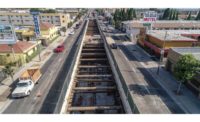Not all concerns have been settled amicably. One local group, Neighbors for Smart Rail, has challenged the Expo Line's environmental review process, contending that it doesn't adequately address potential traffic and parking impacts to surrounding neighborhoods.
The organization filed a lawsuit against the project but lost in the state superior court and also in the appellate court. The California Public Utilities Commission entered the fray on July 13, when it reiterated its approval for the project and its environmental documents.
On Aug. 5, the California Supreme Court, in a 6 to 1 decision, reaffirmed the appellate court decision. Thorpe says he is "gratified" by the win, and the project team "remains focused on finishing the Expo Line on-time and on-budget in 2015."
On the other hand, bicyclists are eagerly awaiting the five-mile-long, $10-million multi-use bike path and walkway that will run parallel to the new line and that will lie within its protected perimeter.
"From my perspective, one of the most interesting stakeholder groups on this project has been the bicycle access groups," says Aparicio. "This is a group we haven't seen before on a transit job, but they are gaining huge momentum in L.A."
He says bike group members have been so involved in community meetings that project owner LA Metro has created a separate "bike liaison" committee to work with them and gather their design and construction input.
"We've done a couple of billion dollars of [transit] jobs, but I have never seen the bicycle groups so involved as this," Aparicio adds. "We've done bike lockers and spaces before but never something so intrinsic to the project as this. And we embrace it."
Project officials estimate that by 2030, 64,000 passengers will ride the Expo Line each day, making it one of the busiest light rail lines in the country.
About 250 craft workers and 75 managers are on the jobsite each day, having completed more than 894,000 hours without a lost-time incident, Freund says.






